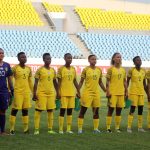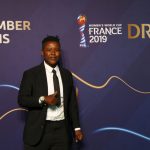The joy and pain that drive Banyana Banyana
The national women’s football team has a knack for bouncing back stronger after disappointment. They’ll need it after being thumped 7-2 by Norway a week before their World Cup debut.
Author:
7 June 2019

If looks could kill, Jermaine Seoposenwe would have massacred the pack of journalists she passed en route to the team bus at Accra Sports Stadium in Ghana on 1 December last year. The Banyana Banyana forward wore a menacing stare that grew fiercer at being asked how she felt about her team losing the final of the Women’s Africa Cup of Nations to Nigeria on penalties.
“What do you think?” she fired back. The friendly and engaging side to Seoposenwe was nowhere to be seen that night. In her place was the serial winner who hates losing. She was civil to the press, but her face and tone gave away the anger she felt at Banyana letting slip their best chance of being African champions for the first time.
Seoposenwe will never forget the pain she felt that day, just like the Banyana players who were in Namibia in 2014 will never forget the pain they felt at narrowly missing out on booking a ticket to Canada for the 2015 World Cup.
Related article:
Sponsors Sasol had already printed T-shirts to celebrate Banyana’s maiden qualification to the World Cup and Desiree Ellis, assistant coach at the time, kept her T-shirt and took it with her to Ghana last year. It was to serve as motivation and a reminder of how close they were to their dreams in 2014, even though their dream became a nightmare when they failed to beat Ivory Coast in the third place play-off to secure a place in that World Cup.
The joy and pain Banyana felt once again in Ghana, though, are permanent visitors to the national team. Pain is never far from joy, and in some instances pain gives birth to joy.
The good and the bad
Banyana beat Nigeria in Equatorial Guinea for the first time in a competitive match to reach the final of the 2012 Africa Cup of Nations, only to lose the final to the hosts after having given their all against the Super Falcons from Nigeria.
Then, the players were promised thousands of rands for qualifying for the World Cup for the first time. But they had to wait a long time to be paid that money and even considered striking ahead of friendlies against the Netherlands in the Winnie Madikizela-Mandela Challenge and Sweden in the Albertina Sisulu Centenary Challenge, just so their grievances would be taken seriously.
It’s an up-and-down existence, but this duality of pain and joy isn’t all bad. The pain they suffer pushes Banyana to work even harder to attain their joy. If it wasn’t for the pain in Windhoek, they wouldn’t have been as driven as they were in Ghana, which led to the joy of being the first Banyana generation to qualify for the World Cup.
If it wasn’t for their threat to strike, the South African Football Association (Safa) wouldn’t have acted to ensure that the players are given what they need and deserve. If it wasn’t for the pain caused by the sight of T-shirts printed with ‘Canada here we come’, they wouldn’t be in France at the moment, getting ready to make their debut in the global showpiece against Spain on Saturday 8 June.
Related article:
Once she calmed down and started to process the loss, Seoposenwe offered a good analysis of the growth of South Africa’s senior national team.
“The players challenge each other, they have become more accountable,” she said. “They have decided that this is what we are going to achieve, so get on board and let’s go for broke. We haven’t let each other down. We have become more united. We have taken more responsibility. More players have stepped up and that’s become key. You can’t leave the young ones behind. We decided to work hard together.
“We vowed to not let anything distract us, the negative things that people are talking about, including money. If we could make the country proud like this, then we have done our job. The rest will follow.
“You just have to make sure that you set goals and everyone is behind achieving those goals. The team has been very selfless in terms of how we play. You have seen players pass the ball in front of goals instead of scoring, a player gives the ball to someone who is in a better position. That selfless humility and being united is what has taken us to a different level.”
Winless streak of 10
This level, however, is still far from that of the best teams in the world. Banyana’s performance in the lead-up to the World Cup was a reminder of that. They are without a win in their past 10 matches, losing to No. 1 ranked United States 3-0, North Korea 4-0, Finland 3-0, Czech Republic 2-1 and the Netherlands 2-1. They drew with Jamaica, Sweden and Finland before they were thrashed 7-2 by Norway in Amiens, France on 2 June. And then there’s the loss to Nigeria in penalties last year. The joy of qualifying for the World Cup has been followed by the pain of reality.
“It’s a concern to the team that we have played some of the best teams in the world, but since the start of 2019 we haven’t won a single game. It’s a concern,” said Banyana vice-captain Refiloe Jane.
Related article:
“It’s something that we want to change going into the World Cup. It’s good that it happened before the World Cup, so that when the World Cup starts, our eyes are open and we know what we have been through. We want to change what has happened in the past. It’s good that we have played all those big games to see how far we are as a collective and what more we can do as a team.”
Ellis, now Banyana’s head coach, blamed their travel arrangements for the 7-2 humiliation. The team arrived at the match venue at 8.45pm, which led to the game that was initially supposed to start at 8pm kicking off at 9.15pm. The result was a disastrous first half, at the end of which they were trailing 5-0.
They regrouped and did better in the second half. But with Germany and China also in their group Banyana will have to bring their A-game all the time, no matter what they experience, to ensure that their dream of appearing in their first ever World Cup doesn’t turn into a nightmare.
Germany and China have 21 major titles between them, including Germany’s two World Cup titles and China’s eight AFC Women’s Asian Cup. Banyana are still seeking their first major title.
A chance to market the team globally
If the qualification to the World Cup was heaven, Group B is hell for Banyana. But the fire they will face in France will sharpen their skills and make them into a stronger team.
Their back-to-back Olympics appearances helped Banyana grow tactically and exposed them to a global audience, which led to an increase in the number of Banyana players playing abroad. This tournament could help talented players such as Bambanani Mbane and Lebohang Ramalepe show that they are ready to play overseas.
“If things go according to plan, and I find myself getting a contract to play outside the country, it would be an achievement for me,” Ramalepe said. “I have been doing so well ever since I started playing for the national team. I feel that my hard work is now being recognised because the coach decided to name me as the second vice-captain.”
But Ramalepe or any other player shouldn’t expect any favours from Ellis.
Related article:
“We have to be critical of ourselves if we want to move forward,” Ellis said. “We need to call each other out, because this is the World Cup we are talking about. We need to call each other out so that we are better in the future.”
Banyana’s World Cup qualification is the shot in the arm that women’s football in South Africa needed to grow. But for this qualification to be meaningful, the promises Safa has made need to become reality. This includes the proposed national league that is scheduled to launch this year. The details are still sketchy, though, with Safa struggling to raise the money it needs to ensure that this project is a success.
Nigeria and Cameroon, the two other African countries playing in the World Cup, have been here before, unlike Banyana. Cameroon reached the last 16 in their debut in 2015 while the Super Falcons, with seven World Cups under their belt, have gone as far as the quarterfinals.
“We promise to go out there and do better than we did the last time,” Nigerian forward Desire Oparanozie, who was in the Super Falcons squads that played in the 2011 and 2015 World Cups, vowed after her team conquered the continent for a record 11th time at the Women’s Africa Cup of Nations in Ghana.
Realistic expectations
Banyana’s biggest challenge is that they aren’t quick to learn from their lessons. Joy always comes to wash away the pain, but the wait for it is normally long and the pain multiplies. They can’t afford to be slow learners in the World Cup because they will be rudely punished for it.
“In all honesty, we know that this is our first time qualifying for the World Cup,” Jane said. “We’ve always tried, for so many years, to qualify for the World Cup. Now that we have qualified for it, we also have to be realistic [in terms of our expectations]. Looking at the group we are in, it’s not an easy one. But football can go any direction, as long as we are prepared, focused and we take our chances. We have to make sure that whatever happens, we have given it our all. We’ve got nothing to lose.”
This is the second time Seoposenwe is part of a group of trailblazers. Nine years ago, she was part of the country’s first women’s Under-17 team to feature in the World Cup. Germany thrashed them 10-1, while Mexico beat them 4-0 and South Korea handed them a 3-1 defeat. Seoposenwe scored both those goals, but she couldn’t celebrate them after the humiliation they suffered on the world stage.
She still remembers that tournament vividly, just like she still remembers the pain she felt in Ghana last year. Seoposenwe will do everything she can to ensure she doesn’t feel that pain again.




